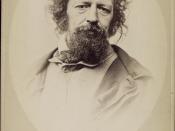The Final Adventure
The child crept closer to the strange bed. So many bizarre machines and tubes. Her mother was crying, but her mother's mother was dying. The child doesn't know what to think, it this good or bad? Her mother said it was good, that Grandma had been sick and this will make her suffering end. But if this is so good, why is everyone crying? This is the scene in many children's lives that cause them to begin pondering the importance of death. Some children never stop wondering about it, and as adults write poetry to help explain the complicated emotions associated with death. Two such poems are "Ulysses" by Alfred, Lord Tennyson and "Do Not Go Gentle Into That Good Night" by Dylan Thomas. The two poems use very different tones to form similar arguments, while varying slightly in their use of family roles and views of aging and death.
The different tones used in these two poems each compliment its own respective argument. In "Ulysses", the tone is one of acceptance and perseverance while in Thomas's work, the tone is rebellious and commanding. Acceptance and perseverance are perfect moods for Tennyson's argument which is that while aging and death are a part of life, you shouldn't let your age be an excuse to stop being active. It is also fitting because the speaker in this poem is an older man, weak and frail. Similarly, Thomas's argument is that there is no excuse for giving in to death instead of fighting it. His tone, which commands rebellion, helps to emphasize the
Hall 2
importance of this argument and comes from the youthful energies of a son who is emotional over the expected loss of his father . Both of these poems
try to convince us to...


